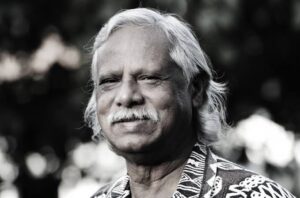For decades both India and Pakistan continued to throw stones at each other showing their military aptitude, cultural superiority and even sports. It happened sometimes latently and sometimes manifestly. For instance, if India tests a missile, the world gets sure that Pakistan is going to test a similar one. This culture of competition has serious impact on both countries’ people’s psyche. The sweat- trickling tension among people of both countries (and even supporters of each team outside of its territory) during Indo-Pak cricket matchs is a great example. No other cricket match has this kind of apprehension.Of course there are reasons why ‘nationalism’ to an Indian does necessarily mean to have hatred for Pakistan and vice-versa. Probably India needs an enemy of outside to keep its states integrated and Pakistan needs it to keep military dominance over politics. Leaders of these countries never gave opportunity to citizens to recall that India was once home for so many people who are now Pakistan’s citizens and India has so many people who were born and grown up in present Pakistan- territory. They most often hang on to hard power practices which fashion their idea of nationalism and fuel the ‘soft power competition’.
In recent days, an unofficial and clandestine competition has been seen between Bangladesh and Pakistan which reminds us of ‘soft power’ concept of Joseph Nye – a distinguished American Political Scientist who served as Assistant Secretary of Defense in the Clinton Administration. The competition is of making and breaching world records. It would probably not be anything to pay heed to unless it is happening at the state-level. The events conjure up with an image of soft-competition between these two countries. This competition gets a triangular shape when Indian records are also breached both by Pakistan and Bangladesh.
The first attention-grabbing event is ‘singing national anthem’. On March 26, people from different places in Dhaka and of different professions started gathering at National Parade Squire in Dhaka early in the morning with immense enthusiasm to sing national anthem of Bangladesh – Amar Sonar Bangla, Ami Tomay Bhalobashi (My Golden Bengal, I love you) – in chorus with tens of thousands of people as part of the celebration of 44th Independence Day of Bangladesh. And finally at about 11:20 am Bangladesh made a world record of singing national anthem in chorus with 254,681 people. The programme has at least two important aspects: firstly; it has been organised with direct authorisation of the Government and secondly; it has broken the former world record by India of singing national anthem in chorus with 121,653 volunteers in Lucknow, on 6 May 2013.
This record making and breaching competition started mainly between Pakistan and India when in 2012 Pakistan had managed to sing national anthem in unison where 44, 200 people joined the event breaking the earlier record of ‘most people singing national anthem at the same time’ by India where 15, 243 volunteers participated on 25th January, 2012. Later India recuperated the record in 2013 with the participation of 121,653 volunteers in Lucknow. But on 26th March, 2014 Bangladesh shattered all previous records singing their national anthem in chorus with 254,681 people. Now we better wait to see whether Pakistan or India breaks this record.
Second event is the ‘forming largest human flag’. The story began after Pakistan had made the largest human flag in October, 2012 with the participation of 24, 200 volunteers in Punjab Youth Festival in Lahore (Hong Kong had the earlier record). Later in 2014, the record was broken by Bangladesh forming the largest human flag with 27,117 volunteers. The story got a climax when Pakistan reclaimed the record in February, the same year with the participation of 29,040 students.
Observing the events anyone can undubitably assess that it’s a ‘soft antagonism’. This antagonism might be the power of both Pakistani and Indian nationalism but in no way Bangladeshi nationalism is based on such contest. The main competition was between India and Pakistan; does Bangladesh join as the third party? They both have nuclear weapons to deter, resources to waste and jingoists to be frantic but Bangladesh is from top to bottom out of these characteristics.
Of course, it’s a matter of pride that Bangladeshi people showed their inner – strength to work together and to love their flag and national anthem but this should not be only for the purpose of breaching others’ records and if so, it will induce Bangladesh to be the third competitor which is sheer gratuitous. Guinness world record definitely is happiness for all of us but it should not be the goal. Because nationalism just for show – up, is not nationalism at all.
S M R Arfanul Alam
Student of International Relations (4th Year)
University of Dhaka.



